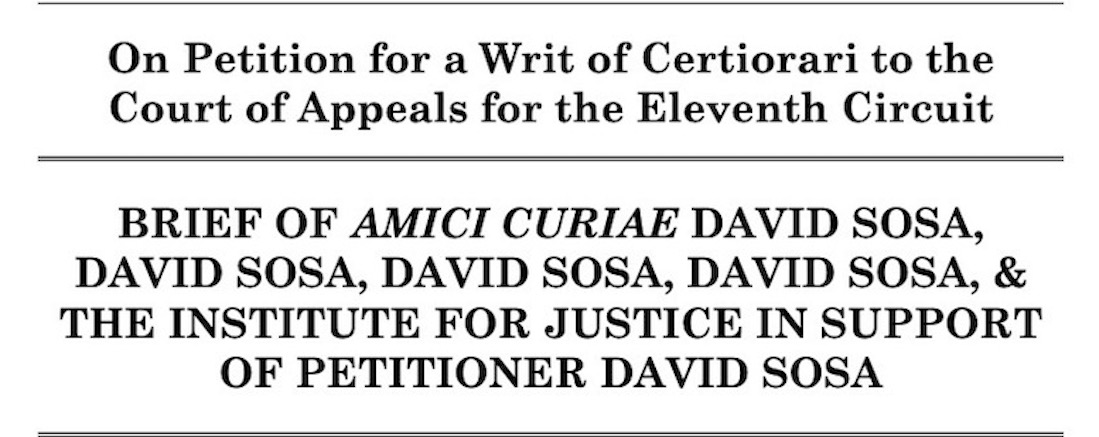
This brief, which was filed recently in the U.S. Supreme Court, begins with "Amici is David Sosas." It's true. The brief was specifically filed by David Sosa and David Sosa. They are all supporting David Sosa’s petition for a certiorariSee David Sosa V. Martin County (Florida), No. 22-1145 (petition dated May 22, 2023). Why are these David Sosas interested in what happened to another David Sosa? They say that if something happened to David Sosa 1, it could happen to David Sosa 2.
Unfortunately, this is not a case where a single person named "David Sosa", is suing multiple times. This wouldn't be autolitigation because a David Sosa would not be suing himself. However, it is still worth discussing. Four different David Sosas, two from North Carolina, and two from California, are supporting a petition from a fifth David Sosa from Florida.
Florida David Sosa has been arrested--twice--after routine traffic stops when a search turned up a warrant for David Sosa's arrest. This warrant was issued nearly 30 years ago, for another David Sosa who was wanted for allegedly selling drugs in Texas. Florida David Sosa did not have the same birthdate, height and weight as Accused Texas Drug Dealing David Sosa. Nor did Florida David Sosa share any tattoos with that guy. Police arrested him nonetheless. In 2014, Florida David Sosa spent three hours in police custody before they confirmed his identity. In 2018, it happened again, and he was held for three days.
Florida David Sosa's innocence is universally acknowledged. The lower courts, however, did not agree with his claim that this was a violation of his Fourth Amendment (and 14th Amendment) rights. The judges disagreed on the reasoning.
The majority of 11th Circuit judges ruled that a detention for three days was not unconstitutional as long as an arrest warrant had been issued. The Constitution doesn't guarantee that innocent people won't be arrested, they wrote. And based on previous precedent, they also held that the Constitution didn’t guarantee that these people would be released in less than 3 days.
According to concurring judges, there may be a right of due process against "overdetention", but that didn't really matter in this case because, under the doctrine "qualified immunity", a reasonable police officer reading [the relevant] court cases "would not know for sure" that a 3-day detention is illegal. They criticized the doctrine as have other highly respected legal scholars. See, for example, "Jury will Decide If Officers Qualify Immunity For Tasing A Guy In The Crotch (Mar. 10 2022). (And other examples therein).
The dissenting opinion was that the Constitution and precedent do not make three days a "magic" number. Florida David Sosa has asked the U.S. Supreme Court for a ruling on the matter.
Four other David Sosas, represented by the Institute for Justice and not including the Accused Texas Drug Deal David Sosa (for whom police appear to still be searching), filed an amici curie brief in support their Florida-named counterpart. The brief states that "as David Sosas, they are interested in this case" because "the ruling below puts them in danger of a three-day lawless detention anytime they're in Florida Georgia or Alabama (which contains the federal districts covered under the 11th Circuit). The Institute claimed that its four David Sosas "have more things in common than Petitioner [Florida] David Sosta shared with [Accused Texas Drug Deal] David Sosa" and are therefore at the same risk. Their brief is in support.
The brief also notes that these are not the only David Sosas in danger. LexisNexis reports that there are 924 David Sosas living in the United States. The brief states that only one David Sosa is suspected of having sold crack cocaine in Harris County in Texas in the 1990s. "Yet, every David Sosa faces up to 3 days in jail with no recourse... whenever police in Florida Georgia or Alabama run an warrant check ,"--assuming that a David Sosa lives in or visits one of these states in the circumstances.
The brief goes on to say that "well over 17000 people in the United States are named John Roberts." It's likely that one of them will have an outstanding warrant and it wont be the person who gets pulled over by police. Coincidentally one of those 17,000 John Robertses happens to be the Chief Justice of the United States. It's unlikely that he will be spending three days behind bars on a warrant issued for another John Roberts who was a crack dealer. However, it is possible that another member of the cohort could.
The brief, on behalf of David Sosas everywhere, and the rest of us as well, argues (quite effectively, I believe) that the Supreme Court, should take this case, reject the “three-day rule,” and, while they're there, should have a second look at the qualified-immunity-doctrine. It concludes that "[t]his Court must grant certiorari to the other David Sosa."
.png) EntertainmentCelebrityComediansAlternative News MediaFunny VideosPrivacy PolicyTerms And Conditions
EntertainmentCelebrityComediansAlternative News MediaFunny VideosPrivacy PolicyTerms And Conditions
